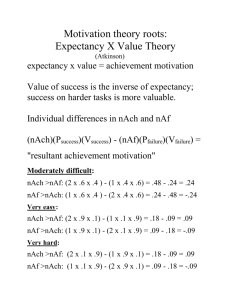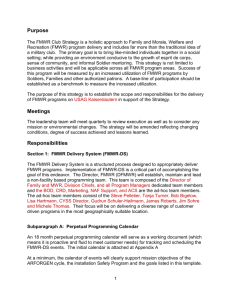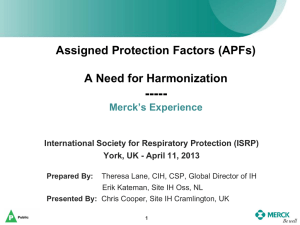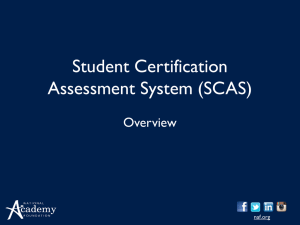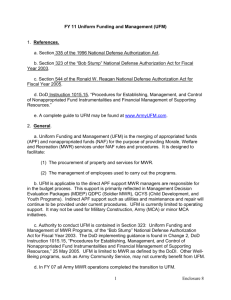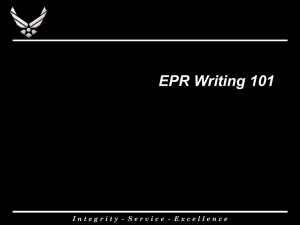File
advertisement
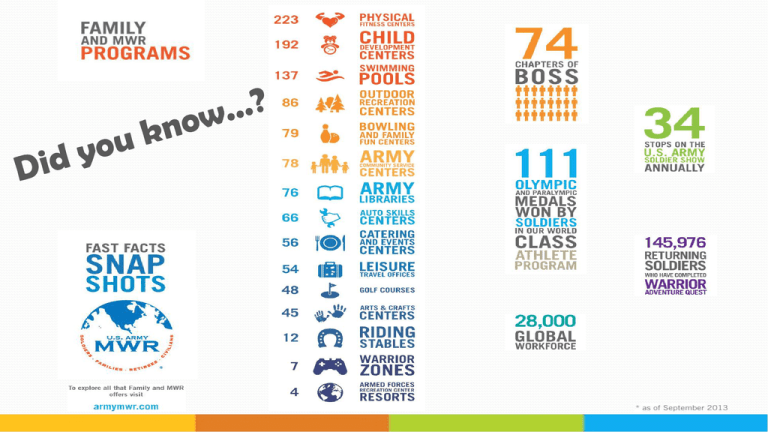
NAF Annual Operating Budget (AOB) Process Welcome From the choices below, please identify one (1) source of funding for your BOSS program. American Tax Payer Appropriated Funds (APF), Tax Dollars, Appropriations, UFM Soldiers, Family Members, Civilians, Retirees Non-Appropriated Funds (NAF), Sales, Soldier Dollars Private Business Sponsorship, Donations Knowledge Check – Funding Categories Which of the following are the bases for categorization of Family and MWR activities? (Select all that apply) The relationship of the activity to readiness & retention The size of the installation The activity's ability to generate revenue Availability for corporate sponsorship BOSS •MIX APF & NAF •Enhanced Community Support Activities •Provides for the readiness & retention of Soldiers & contribute to the military mission by fostering a sense of community spirit •Have potential to raise a limited amount of NAF $, but lack the ability to sustain themselves based purely on their business. •Authorized to receive the majority of their funding from APF funds - total amount depends upon the installation commander's priorities & availability of funds •Examples: Child and youth services, arts and crafts, auto crafts, bowling centers with 12 or less lanes, & outdoor recreation services Category •100 % APF •Mission Sustaining Activities •Critical for retention and readiness of Soldiers •Promotes the physical and mental well-being of the soldier •Little or no ability to generate NAF $ •Authorized to be funded 100% with APF dollars - authorization, however, does not guarantee fund availability •Examples: Libraries, recreation centers, and fitness/sports operations Category Category FMWR Funding Categories •NAF FUNDED •Business Activities •Considered nonessential from the perspective of the military mission •Desirable as a means of providing recreational activity with morale benefit •Business activities with highest capability of generating revenues •Should be self-sustaining •Receive little or no direct APF support & are expected to generate a profit •Some exceptions for remote sites & OCONUS installations •Examples: Clubs, golf courses, & bowling centers Objectives Recognize FMWR Funding Categories Identify NAF regulations and operating guidance that pertain to BOSS Explain sources & streams of funding for FMWR programs Describe the monthly income statement & categorize the major elements Define analysis, recognize trends, & understand a variance Identify BOSS Program measures & their relationship to various tools, standards, & systems Nested Strategies – How BOSS supports the Army’s Mission Identify & apply the NAF Annual Operating Budget (AOB) Process Describe the NAF 5yr Plan Program Requirements & apply to inclusion in the AOB Define the components of the Manager’s Narrative & relate to budget & planning process Regulations and Policies Legal & fiduciary responsibilities for proper use of APF & NAF • AR 215-1 • DOD 7000.14-R • AR 11-2 • DFAS-IN 37.1 Operating Guidance/Standard Operating Procedures SPECIFIC TO BOSS – Lacking/Nothing Current • Desk Reference and Circular (Reference Material Only) Fund Manager • Appointed • Monitors FMWR activities • Ensures management controls are in place Funding Levels Determined How are individual Garrison MWR APF funding levels determined? QACS Divide Available Army-level Funding •Non-MWR MDEP •APF POM Process QCYS QDPC •Funding by Space •Garrison-level Reporting = IRO •MWR Baseline Standards •Garrison-level Reporting = ACRRO Funding FMWR Point: FMWR support utilizes a blend of funds NAF APF MCA Self Generated OMA BASOPS Utilities SRM New Work FMWR MDEPS Outside Sources Donations UFM MWR USA AAFES Commercial Sponsorship ARMP Trust Fund NAF and NAFI Nonappropriated Funds (NAF) Government funds Not appropriated by Congress Same fiduciary responsibility as for Appropriated Funds (APF) NAF Instrumentality (NAFI) Maintain custody & control of NAFs Tax exempt Separate FMWR, Lodging, Chaplains, Civilian Welfare, Post Restaurant Funds Uniform Funding & Management What is it? A Process. UFM Procurement of property and services for FMWR Management of employees to provide the programs Financial reporting and management UFM is a DOD-wide FMWR initiative UFM does not increase or decrease funding. It is an alternate means of execution. Give Us Your Digits! Do you know your Program, Location, and Department Codes? The Standard NAFI Number Rolling Things Up Income Statement What is an Income Statement and what is it used for? • Formal documentation of NAF program financial performance • Historical document prepared 15 to 20 days after the close of the monthly accounting period • Compares revenue to expenses • Reflects net income or loss for the period Income Statement The basic income statement format is: Revenue - Expense = Net Income (or Loss) Analysis How do you conduct an analysis? Analysis Defined Comparative analysis is a method used in the examination of financial statements to identify new trends by the item-by-item comparison of two or more sets of data Trends What are some Trends in your program? The + or – of Financial Trends Expressed as either positive or negative In general, when revenue is "down" or expenses are "up," the financial trend is considered negative Conversely, when revenue is "up" or expenses are "down," the financial trend is considered positive Review and take action to correct negative trends Successful managers also analyze positive trends to determine causes so that similar strategies can be applied in the future Revenue Expense What is a Variance? In Financial Management, a variance is the difference between a budgeted, planned or standard amount and the actual amount incurred Variances can be computed for both expenses and revenues The concept of variance is intrinsically connected with planned and actual results and effects of the difference between those two on the performance of the entity What is a Variance? What are you measured against? Headquarters guidance Industry standards Local standards The Army’s mission is to fight and win our Nation’s wars by providing prompt, sustained land dominance across the full range of military operations and spectrum of conflict in support of combatant commanders. Formulating Strategy SWOT Strengths & Weaknesses Exercise 1. In your breakout group identify as many Strengths or Weaknesses for the BOSS Program at the enterprise level. 2. Chart your responses on the butch-board. 3. Select a spokes person to brief back to the main group. You will have 10 mins to brainstorm, discuss, decide, chart and be ready to quickly brief back to the main group. Opportunities & Threats Exercise 1. In your breakout group identify as many Opportunities or Threats the BOSS Program at the enterprise level. 2. Chart your responses on the butch-board. 3. Select a spokes person to brief back to the main group. You will have 10 mins to brainstorm, discuss, decide, chart and be ready to quickly brief back to the main group. SWOT Wrap Up • Know the mission and vision • Pay attention to the world around you and what your • • • • • competition is doing Keep a running SWOT on your desktop Recognize your Strengths Seek out Opportunities Remember that you are the lead strategist Have fun! Annual Operating Budgets Appropriated Fund Basics Centralized Process Six-year plan Next fiscal year = budget year Five following years = out years Leads to the President’s annual budget Passed by Congress Signed by the President Annual Operating Budgets Non-Appropriated Funds Budget Process NAF AOB Process 5 Steps to Preparing a NAF AOB Compile Historical Data Calendars Activity, FMWR, Garrison, Local Economy, etc. Financial Monthly Income Statements, DARs, Deposits, Variance Reports, etc. Non-Financial AARs, Marketing Plan, Participation #s, Customer Feedback, Command Changes, Competition, Lifestyle Trends, Regulation and regulation change 5 Steps to Preparing a NAF AOB Apply Trend Analysis 5 Key Financial Trends How has my program performed over the last 3-5 yrs? Did I execute my program to budget last year? What months were better than others? What programs, activities, initiatives did better than others? Was participation up or down? 5 Steps to Preparing a NAF AOB Determine Factors that will impact Future Fluctuations in Income Budget reductions and revisions Funding cuts/efficiencies Govt/Politics – drawdown or up? Policy changes Command changes Strategic Plans/Guidance Operating guidance World and US economies Laws Currency changes (OCONUS) Weather Environment/sustainability 5 Steps to Preparing a NAF AOB Forecast Performance By event or program Participation Should I be making a profit? Should I be applying break-even analysis? 5 Steps to Preparing a NAF AOB Review the “BIG PICTURE” Does my data make sense? Do my numbers and dollars appear reasonable? Am I providing my customers with the services they want? Am I providing my customers with the level of service(s) they want and deserve? Are my assumptions based on data and are they reasonable? Can I live up to my projections? 5yr Plan The Army requires that each installation develop or revise its 5year plan annually. As a part of this process, activity managers are required to do the same for their activities. Benefits of the 5-year plan: Balanced Family and MWR installation program Integration of Family and MWR activities Prioritizes programs according to significance to readiness and retention Meets the needs and desires of the community 5yr Plan Program Requirements AR 215-1 Guidelines: At a minimum, plans will integrate the results of Comprehensive review(s) Needs assessment(s) Priorities Financial management strategies Manager’s Narrative Part of the 5-year planning process What is it? Manager’s Narrative Describes Current program Out-years Includes Needed construction, personnel adjustments, program changes, revenue generators, equipment, etc. Planned changes or improvements Incorporates manager’s decisions & ideas into long-range plan Covers the budget year & the next four years Manager’s Narrative 1. 2. 3. Knowledge Check 1. What are Appropriated Funds? 2. What are Nonappropriated Funds? 3. Name at least 1 office that has responsibility for managing NAF. 4. Name at least 1 regulation that governs the use of NAF. Wrapping it up You are at the heart of this process and that of managing your BOSS Program If you are not involved in this process…someone else is making all the decisions for you Get Involved! Questions?

